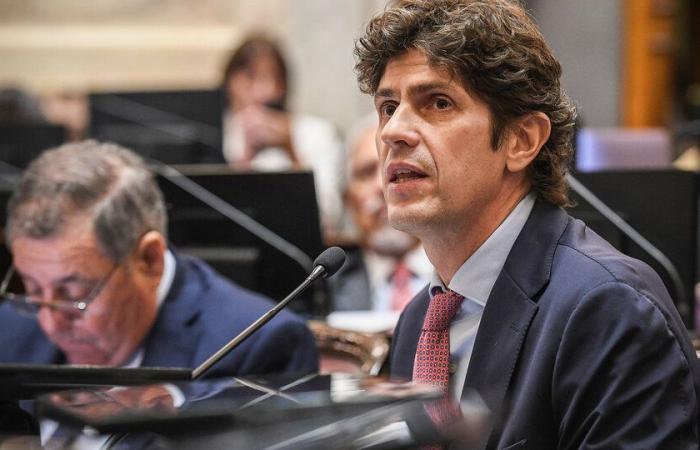
Martín Lousteau concluded the session of the Bases law without stopping with the chicha or the lemonade. On the one hand, the most opposition sectors questioned him for giving the Government a quorum and allowing the law that was finally approved to be discussed. For the other, The sector of radicalism led by Alfredo Cornejo once again emphasized that it was left in absolute solitude in its vote against: 12 senators to one. It was another attempt to file him down to take away the presidency of the UCR at some point, although that moment will not be soon: Lousteau still retains the support to maintain the position and removing him is not in Cornejo’s possibilities today. The opposition profile for the party that Lousteau was looking for was seriously blurred: the UCR guaranteed Javier Milei the law in both chambers.
Lousteau did everything possible to differentiate himself during the treatment of Milei’s megalaw in the Senate: he asked incisive questions during visits by officials, questioned aspects of the investment regime, and finally broke away from the rest of his bloc and presented his own opinion of minority, because – he argued – “the changes are cosmetic.” He announced that, as things stood, he was voting against the Base Law. It was assumed that with the support of the radical Pablo Blanco, who had accompanied him in the rejection of the MegaDNU. But Blanco changed his vote on delegated powers at the last minute, leaving Lousteau even more alone..
quorum donor
Lousteau also gave in a little: when the two senators from Santa Cruz announced that they were not going to provide a quorum, they put the session in crisis, which would never have been able to start if Lousteau had not had a cordial meeting with Vice President Victoria Villarruel, and then announced that he was going to sit on your bench to give the discussion. This was the gesture that most criticized him from Kirchnerism and, more generally, from all opposing sectors. Even he was a victim of memes.
The senator raised his glove and made his defense of his strategy. “Our alternative opinion sought to include and care for retirees, education, public works and the middle class. In yesterday’s session we were able to apply some of these proposals: we removed foreigners, front men, companies controlled by officials and the beneficiaries of social plans,” said Lousteau in a tweet that functioned as a defense.
Obviously, these explanations were of no use to the opposition sectors. Memes are not negotiated.
On the right
But just as there were those who wanted to run it on the left to create a quorum, other sectors of dialogical radicalism ran it on the right. This is Cornejo’s sector, which disagrees with Lousteau’s strategy of trying to prop up the UCR as a clearly oppositional space. Every time Lousteau is left alone in a vote they mark it: They did it with the DNU (only him and Blanco against) and now with the Bases Law (Lousteau alone against 12 senators who responded to the radical governors, much more agreeable).
They did not fail to score Lousteau’s attempt towards the end of the training session. include the discussion of the university budget and the FONID in the debate. His co-religionists did not accompany him (literally, they voted against him), just as the sector led by Rodrigo De Loredo turned its back on the universities in Deputies when retirements were discussed. In the lower house, only Facundo Manes’ deputies supported the idea of financing the study houses. The rest of the UCR preferred to leave the issue for July. University teachers can wait.
At this point, it must be said that, internal aside, Lousteau’s intention to leave his party as a clear opposition space is foundering: Except for retirements, they have not accompanied any opposition initiative. They did not reject the DNU, they guaranteed the approval of the Bases law and even abandoned the universities, which in many cases are led by other coreligionists. For Lousteau, this strategy alienates them from their historical base of voters, those who marched across the country for the university budget.
Lousteau was also distanced from the radical governors, who had a meeting with the block of UCR senators that the president of the National Committee did not attend. It was a meeting, basically, to try to guarantee that everyone voted for the law. With Lousteau, they did not succeed. “We tried to convince him not to be left alone”say his colleagues on the bench.
Despite the criticism, There is no risk of Lousteau losing the party presidency. Cornejo simply does not have the internal votes to achieve it. And it would also be a very expensive scandal to remove him from that place now. However, Cornejism does not miss the opportunity to point out that Lousteau is increasingly isolated and separated from the direction the UCR is following.

